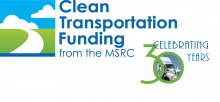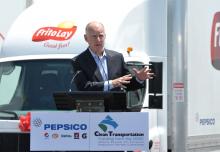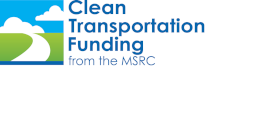
We are presenting six more projects that reflect the three decades of Clean Transportation Funded-programs that have helped to clean up the air in Southern California:
- “Drive Less. Smile More” Rideshare Campaign (2013)
In the fall of 2013, the MSRC launched a Rideshare Thursday campaign themed, “Drive Less. Smile More.” to rally commuters to get out of their solo cars and into carpools and vanpools, and onto bicycles and mass transit to help save money on gas, reduce the stress from driving, and reduce traffic and pollution. The campaign involved a media blitz with clever radio spots and interactive online messaging encouraging drivers to “Drive Less. Smile More” by ridesharing. A unique aspect of the campaign was the MSRC’s partnership with the Los Angeles Kings. Former Kings player and Hall of Famer, Luc Robitaille, was featured in a public service announcement pointing out how hockey and being stuck in traffic are both about making the right move, and ridesharing is the best move commuters can make. The video was played at all regular season home games on the Jumbotron, displayed in digital ads, and on the Kings’ Facebook page.
- Tools for commuters (multi-year)
The MSRC helped fund local agencies’ development of tools designed to aid commuters in traveling efficiently and safely. The Commutesmart.info website is supported by all of the transit agencies in the South Coast region and provides free services to make it easy for commuters to rideshare. The Regional Inland Empire 511 Program (IE511.org) and the Go511 app for LA, Orange, Riverside, San Bernardino and Ventura Counties, provide up-to-the-minute traffic updates, as well as real-time public transportation information. The 511 services provide travelers with commuter-related information to reduce travel time and to provide them with a more efficient way to use transportation resources, thereby helping to reduce congestion on Southern California roadways and improve air quality.
- Frito Lay electric trucks (2012)

The MSRC partnered with Frito Lay and the State of California to provide funding to help bring into service 105 all-electric Frito-Lay delivery trucks, the largest deployment of zero-emission trucks in any state at the time. Frito Lay estimated that when all 105 trucks were put into service at the end of 2012, the company expected to save 200,000 gallons of fuel and eliminate nearly 4.5 million pounds of greenhouse gases annually. To celebrate these new trucks, then Governor Jerry Brown and former MSRC Chair Greg Winterbottom were on-hand at the company’s distribution center in Torrance to participate in a press event and truck demonstration (see photo).
- Medium-duty CNG trucks (2013)
The MSRC was interested in helping get cleaner medium-duty trucks on the road because they are the delivery vehicles most prominently seen in our local neighborhoods with lots of starts and stops along their routes. The MSRC provided funding for Ryder to purchase 19 CNG medium-duty freight trucks that were targeted for local delivery service operations. The MSRC-funded vehicles were part of Ryder’s rollout of 39 light- and medium-duty CNG trucks in California, the first of their kind in North America available for lease or rent by the public. The MSRC also helped Fox Transportation purchase 20 new medium-duty CNG delivery vehicles, which service more than 150,000 pharmacies and hospitals annually throughout the four-county area. These vehicles will travel approximately 1.2 million miles per year, so the emissions saving potential is significant.
- OC Fair Express (multi-year)
The MSRC provided funding to the Orange County Transportation Authority to fund the OC Fair Express to get fair-goers out of their cars and onto public transit to get to the summer’s OC Fair. The OC Fair Express offered fair-goers a $2 fare each way, taking them right to the entrance gates of the Fair without the hassle of driving in traffic and finding remote parking. Riders also received discounted Fair admission, saving riders $9 off the regular admission price. Deploying 22 40-foot, natural gas buses, the service provided hourly, non-stop direct service from eight park-and-ride lots throughout Orange County to the OC Fair on Fridays, Saturdays and Sundays. In addition to providing convenience for the riders, the OC Fair Express also helps mitigate traffic in the area. More than 75,000 people rode the Express each summer.
- Bike programs (multi-year)
The MSRC has always been interested in supporting alternative modes of transportation – like biking – and has funded innovative programs to encourage people to get out of their cars and onto bikes. The MSRC funded the former "BikeMetro" website, an internet bicycle routing and mapping program that was ahead of its time – available before Google bike map functions were handy – as well as providing electric bicycles, along with traditional bikes, to law enforcement agencies. In Palm Springs, the MSRC helped fund sixty bicycle-shaped racks, twenty “hitch” bike racks, and three bike corrals in the downtown area, providing 166 spaces for bike parking. Bike corrals are located near the curb, and are about the length and width of a parallel street parking space. This allows cyclists to park their bikes without taking sidewalk space away from pedestrians. In Irvine, the MSRC helped the City complete improvements on the San Diego Creek Bikeway, which connects Irvine to the neighboring city of Newport Beach. Improvements included new lighting, installing and repairing cable railings along the trail in areas where they were missing or broken, and putting in pavement striping and bikeway signs to direct cyclists to trail access points. Moreno Valley had an exciting e-bike pilot program, which the MSRC helped get off the ground, that featured four electric bikes, new bike lanes, bike racks, and trail crossing improvements. The City of Pomona implemented an innovative bike detection program that senses when a bicyclist is present at an intersection; the system detects the bicyclist and triggers the signal helping to maintain the traffic flow. In Orange County, four bikeways throughout the region were given facelifts by constructing new bikeways, installing new lighting and upgrading the classes of bikeways to improve safety.
The fall edition of the MSRC’s Clean Air Roadmap will highlight the final six projects we will be featuring to celebrate the work of the MSRC over the 30 years.
